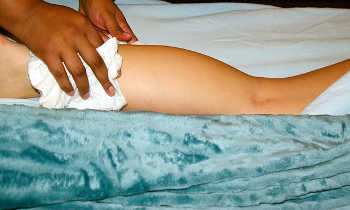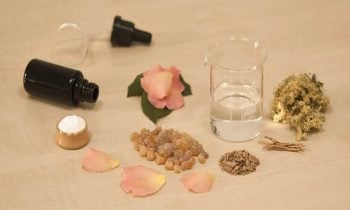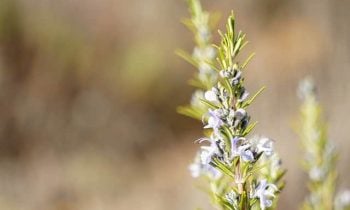The Top Frequently Asked Questions and Answers about Aromatherapy and Essential Oils
The following list includes some of the most frequently asked questions (and answers) on essential oils and aromatherapy, compiled from respected books on the subject, as well as Internet forums and chat rooms where those topics are discussed. If you have any pressing questions about the practice of aromatherapy, or the use of essential oils, there is a good chance your question is asked and answered below.
![]() What are essential oils and what do they do?
What are essential oils and what do they do?
![]() Essential oils get their name because they come from the “essence” of plants. Liquid is extracted from leaves, flowers, roots, bark, seeds and other plant parts, often through a steam-based distillation process. They may alternately be expressed through a cold-pressed process, or mechanically. Technically, this solution is not an oil, but a collection of liquids from a plant which makes a solution that is extremely potent.
Essential oils get their name because they come from the “essence” of plants. Liquid is extracted from leaves, flowers, roots, bark, seeds and other plant parts, often through a steam-based distillation process. They may alternately be expressed through a cold-pressed process, or mechanically. Technically, this solution is not an oil, but a collection of liquids from a plant which makes a solution that is extremely potent.
![]() What are the specific benefits of essential oils?
What are the specific benefits of essential oils?
![]() Essential oils can be used for repelling insects, cleaning around the home, many offer substantial physical benefits, and you can use them to make your mind sharper or help you relax and unwind at the end of the day.
Essential oils can be used for repelling insects, cleaning around the home, many offer substantial physical benefits, and you can use them to make your mind sharper or help you relax and unwind at the end of the day.
Specific oils deliver specific benefits, and a helpful guide like The Complete Book of Essential Oils and Aromatherapy, Revised and Expanded (a short review and recommendation is listed in the Resources section at the end of this FAQs list) will list different oils and their uses.
![]() How many essential oils are there?
How many essential oils are there?
![]() There are hundreds of essential oils, and a limitless number of blends or recipes which use two or more oils. Because of the sheer volume and number of essential oils and their benefits, in truly every area of your life you can benefit from the use of these oils.
There are hundreds of essential oils, and a limitless number of blends or recipes which use two or more oils. Because of the sheer volume and number of essential oils and their benefits, in truly every area of your life you can benefit from the use of these oils.
![]() For how long have essential oils been used? Is this a new thing?
For how long have essential oils been used? Is this a new thing?
![]() Using essential oils for their medicinal benefits is a practice that is more than 5,000 years old. Many ancient cultures used oil derived from plants as natural medicines, in religious and cultural ceremonies, and to ward off evil spirits.
Using essential oils for their medicinal benefits is a practice that is more than 5,000 years old. Many ancient cultures used oil derived from plants as natural medicines, in religious and cultural ceremonies, and to ward off evil spirits.
![]() How should I store my oils?
How should I store my oils?
![]() Only store essential oils in glass bottles which are dark in color, to keep artificial light and sunlight from weakening your oil. In addition to light, heat can damage your oils and cause them to deteriorate. Some aromatherapy gurus recommend storing essential oils in the refrigerator, as this allows them to last twice as long as oils kept at room temperature.
Only store essential oils in glass bottles which are dark in color, to keep artificial light and sunlight from weakening your oil. In addition to light, heat can damage your oils and cause them to deteriorate. Some aromatherapy gurus recommend storing essential oils in the refrigerator, as this allows them to last twice as long as oils kept at room temperature.
If you do refrigerate your oil, allow it to come to room temperature before using. Carrier oils can be kept in the refrigerator as well, don’t forget to remove the droppers from your oil bottles after each use, and make sure bottles are tightly sealed.
![]() What does aromatherapy mean?
What does aromatherapy mean?
![]() The website Aromatherapy.com gives the following definition for aromatherapy:
The website Aromatherapy.com gives the following definition for aromatherapy:
Aromatherapy is the practice of using the natural oils extracted from flowers, bark, stems, leaves, roots or other parts of a plant to enhance psychological and physical well-being.
The aromatic nature of certain essential oils triggers physical and mental responses in the human body that lead to a number of health benefits. This is the science behind aromatherapy. Just by smelling a certain aroma produced by nature, you can positively impact your health and well-being.
![]() Is “aromatherapy oil” the same thing as “essential oil”?
Is “aromatherapy oil” the same thing as “essential oil”?
![]() Aromatherapy oils are not the same as essential oils. Essential oils are undiluted and extremely potent. Aromatherapy oils are made up of approximately 2% essential oil and 98% carrier oil such as almond oil or grapeseed oil. Aromatherapy oils can be used topically, applied to the skin, while essential oils are too potent to safely contact human skin without diluting them first.
Aromatherapy oils are not the same as essential oils. Essential oils are undiluted and extremely potent. Aromatherapy oils are made up of approximately 2% essential oil and 98% carrier oil such as almond oil or grapeseed oil. Aromatherapy oils can be used topically, applied to the skin, while essential oils are too potent to safely contact human skin without diluting them first.
![]() What is a diffuser?
What is a diffuser?
![]() A diffuser is an object used to fill the air with the aroma produced by essential oils. There are 4 main types of diffusers:
A diffuser is an object used to fill the air with the aroma produced by essential oils. There are 4 main types of diffusers:
1. Nebulizer
2. Ultrasonic diffuser
3. Heat diffuser
4. Evaporative diffuser
Ultrasonic and nebulizer diffusers deliver a much better experience than evaporative and heat diffusers, but they are more expensive as well.
![]() Are all essential oils the same? How do I know which ones to buy?
Are all essential oils the same? How do I know which ones to buy?
![]() Different essential oils deliver different benefits and have different uses. As far as quality is concerned, all essential oils are definitely not the same. Unfortunately, there is no agreed-upon or official grading system for essential oils.
Different essential oils deliver different benefits and have different uses. As far as quality is concerned, all essential oils are definitely not the same. Unfortunately, there is no agreed-upon or official grading system for essential oils.
Organic essential oils and rectified or re-distilled essential oils are more expensive than standard oils, and the most common types of essential oils will be made through distilling or cold pressing. As with any purchase you make, you should get to know the reputation and integrity of a company that sells the essential oils you are thinking about buying.
![]() What are some good oils to start out with for a beginner to aromatherapy?
What are some good oils to start out with for a beginner to aromatherapy?
![]() An argument can be made that lavender is the most versatile and useful essential oil. The same could be said for peppermint, lemon and tea tree oil. Many popular aromatherapy starter kits will include lemongrass, orange, peppermint, rosemary, frankincense, eucalyptus, lavender and tea tree oils.
An argument can be made that lavender is the most versatile and useful essential oil. The same could be said for peppermint, lemon and tea tree oil. Many popular aromatherapy starter kits will include lemongrass, orange, peppermint, rosemary, frankincense, eucalyptus, lavender and tea tree oils.
![]() How much do essential oils and a good diffuser cost?
How much do essential oils and a good diffuser cost?
![]() Because essential oils are so potent, just a drop or two often gets the job done, whether used topically or with a diffuser. Because of this, you will often see oils sold in small, 10 mm bottles. There are just about as many sellers of essential oils as there are oils themselves, so price varies dramatically.
Because essential oils are so potent, just a drop or two often gets the job done, whether used topically or with a diffuser. Because of this, you will often see oils sold in small, 10 mm bottles. There are just about as many sellers of essential oils as there are oils themselves, so price varies dramatically.
The Aromatherapy Top Essential Oils Set 100% Pure and Natural – Basic Sampler Gift Set & Kit mentioned in the resources section at the end of this report usually retails for around $20, and gets you 8 of the most versatile and popular oils.
As far as a diffuser goes, the InnoGear Aromatherapy Essential Oil Diffuser also mentioned in the resources section is available for about $20 as well. Essential oil prices will vary a great deal, so always shop around, and once you find a reliable distributor with a good reputation, stick with that company.
![]() Can you mix or blend essential oils?
Can you mix or blend essential oils?
![]() Yes, combining different essential oils is often done to provide a desired health benefit. For instance, a combination of lavender, orange and frankincense is often diffused for anxiety and stress-relief.
Yes, combining different essential oils is often done to provide a desired health benefit. For instance, a combination of lavender, orange and frankincense is often diffused for anxiety and stress-relief.
![]() How much oil should I use?
How much oil should I use?
![]() Different essential oil recipes require different amounts of oil. In standard diffuser applications, anywhere from 5 to 10 drops of oil will be used. In topical applications where you are applying a mix of essential oils and a carrier oil to your skin, you may only use 2 to 5 drops of essential oil. With most diffusers, the owner’s manual will tell you to start with around 5 drops and experiment until you get the desired result.
Different essential oil recipes require different amounts of oil. In standard diffuser applications, anywhere from 5 to 10 drops of oil will be used. In topical applications where you are applying a mix of essential oils and a carrier oil to your skin, you may only use 2 to 5 drops of essential oil. With most diffusers, the owner’s manual will tell you to start with around 5 drops and experiment until you get the desired result.
![]() What does the term “carrier oil” refer to?
What does the term “carrier oil” refer to?
![]() A carrier oil is used to dilute essential oils so they won’t cause irritation, redness, burning and other health problems when applied to the skin. Carrier oils get their name because they carry essential oil onto your skin. They are usually derived from the fatty components in plants, and coconut oil, avocado oil and almond oil are examples of carrier oils used in aromatherapy.
A carrier oil is used to dilute essential oils so they won’t cause irritation, redness, burning and other health problems when applied to the skin. Carrier oils get their name because they carry essential oil onto your skin. They are usually derived from the fatty components in plants, and coconut oil, avocado oil and almond oil are examples of carrier oils used in aromatherapy.
![]() Can essential oils be consumed?
Can essential oils be consumed?
![]() In most cases it is not recommended to consume essential oils. There are a few exceptions, but for the most part, essential oils should only be used with a diffuser or in a topical application.
In most cases it is not recommended to consume essential oils. There are a few exceptions, but for the most part, essential oils should only be used with a diffuser or in a topical application.
![]() Can you safely put essential oils on your skin?
Can you safely put essential oils on your skin?
![]() Essential oils are sometimes applied directly to your skin, but should never be used this way at full strength. When applied topically, an essential oil must be cut or diluted with a carrier oil or massage oil.
Essential oils are sometimes applied directly to your skin, but should never be used this way at full strength. When applied topically, an essential oil must be cut or diluted with a carrier oil or massage oil.
![]() How long can I use essential oils in a diffuser?
How long can I use essential oils in a diffuser?
![]() Essential oils are extremely powerful, so in a short period of time diffusing, you can reap multiple benefits. As a general rule, you should only diffuse for short periods of time. Multiple studies show diffusing for 30 to 45 minutes delivers the maximum benefits, and after that, the human body and mind stop responding to the aromas you are diffusing.
Essential oils are extremely powerful, so in a short period of time diffusing, you can reap multiple benefits. As a general rule, you should only diffuse for short periods of time. Multiple studies show diffusing for 30 to 45 minutes delivers the maximum benefits, and after that, the human body and mind stop responding to the aromas you are diffusing.
![]() What are the most versatile, beneficial essential oils?
What are the most versatile, beneficial essential oils?
![]() It was mentioned earlier that lavender oil is arguably the most versatile, and therefore the most beneficial, of all the essential oils. Lavender can be used in combination with a carrier oil as an antiseptic for treating burns and cuts. It is also used to prevent infection and increase the rate at which your body heals itself. It is a powerful anti-inflammatory and decongestant, works as an antidepressant and stress-reliever, and promotes restful sleep.
It was mentioned earlier that lavender oil is arguably the most versatile, and therefore the most beneficial, of all the essential oils. Lavender can be used in combination with a carrier oil as an antiseptic for treating burns and cuts. It is also used to prevent infection and increase the rate at which your body heals itself. It is a powerful anti-inflammatory and decongestant, works as an antidepressant and stress-reliever, and promotes restful sleep.
Clove, peppermint, thyme, chamomile, tea tree, lemon and geranium essential oils are some other popular oils, because of the health benefits they provide. You should choose an oil depending on what type of mental or physical health reward you are looking for. The book recommended in the following resources section can tell you what oil you should use to deliver the benefits you are trying to receive.
Recommended Resources
• The Complete Book of Essential Oils and Aromatherapy, Revised and Expanded: Over 800 Natural, Nontoxic, and Fragrant Recipes to Create Health, Beauty, and Safe Home and Work Environments by Valerie Ann Worwood
This wonderful book is considered by many to be an indispensable guide to essential oils and aromatherapy. It is available in both paperback and e-book formats on Amazon. The author is a certified aromatherapist as well as a respected and active member of and contributor to the International Federation of Aromatherapists.
Aside from her personal research on how aromatherapy and essential oils can be used to treat infertility and endometriosis, she is an aromatherapy consultant to multiple natural health and beauty clinics. This book comes highly recommended.
• Beginners Best of the Best Aromatherapy Gift Set- 12/ 10 ml (100% Pure Therapeutic Grade Essential Oils)
This affordable beginners kit of essential oils contains the most popular and versatile oils. Oils are packed in protective amber colored glass bottles to prevent damage from lighting, and this “best of the best oils” aromatherapy gift set has earned a 4.6 star customer satisfaction rating from more than 4,000 purchasers on Amazon.
• Aromatherapy Top Essential Oils Set 100% Pure and Natural – Basic Sampler Gift Set & Kit (Lavender, Tea Tree, Eucalyptus, Lemongrass, Orange, Peppermint, Rosemary, Frankincense)
This beginner’s kit which also makes a great gift contains 8 of the most commonly used essential oils. These oils are 100% natural and pure, and contain no additives or fillers. Consistently the #1 bestseller in the Aromatherapy Oils category at Amazon, this essential oils kit has earned an impressive 4.4 start customer satisfaction rating on Amazon from nearly 10,000 purchasers.
• InnoGear Aromatherapy Essential Oil Diffuser Portable Ultrasonic Diffusers with Color LED Lights Changing and Waterless Auto Shut-off Function for Home, Office, Bedroom
This InnoGear Aromatherapy Essential Oil Diffuser has earned a stellar 4.4 start customer satisfaction rating (out of a possible 5 stars) from more than 10,500 customers on Amazon. It is commonly ranked as the #1 bestseller out of all the aromatherapy diffusers at Amazon.
One of the cool features of this product is that it has 7 changing mood lights. You can set the diffuser to automatically cycle through each of the different colors, you can choose your favorite color to display constantly, or you can turn off this feature. You can set this diffuser to Intermittent (30 seconds on and 30 seconds off), or Continuous Mist mode. In continuous mode, you can expect a full 3 hours of use, and more than 6 hours when you choose the intermittent setting.


 Gift Giving Guidelines
Gift Giving Guidelines 6 of the Most Popular Essential Oils and What They Can Do for Your Health
6 of the Most Popular Essential Oils and What They Can Do for Your Health 7 Essential Oils for Energy
7 Essential Oils for Energy